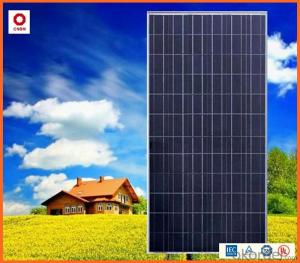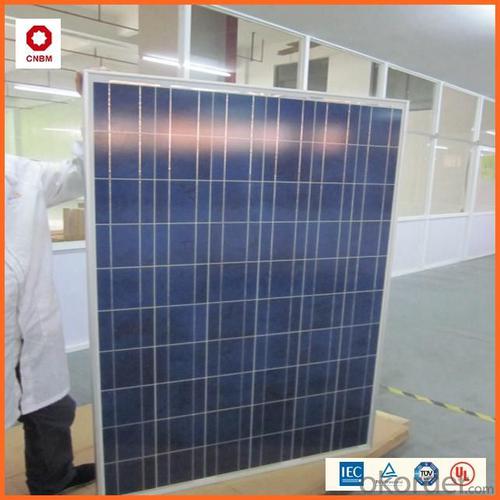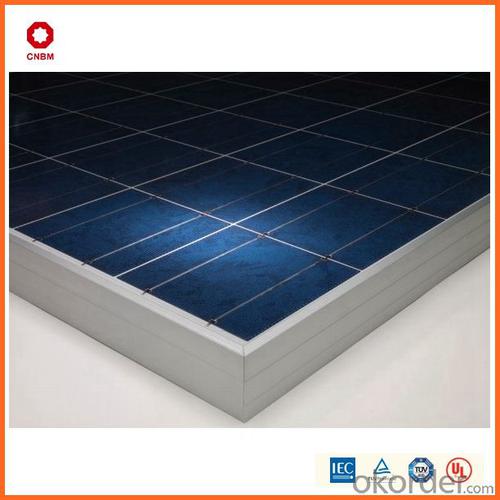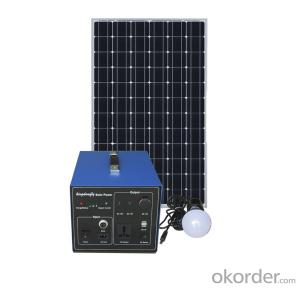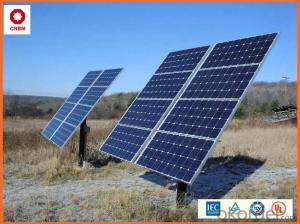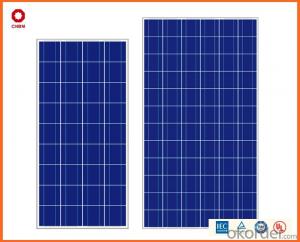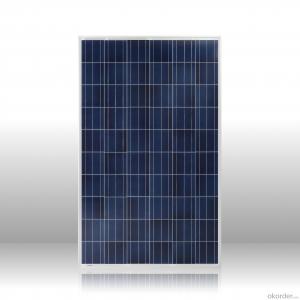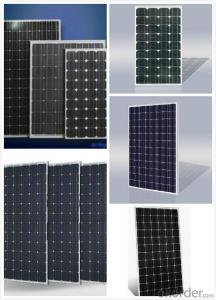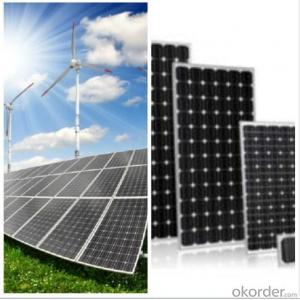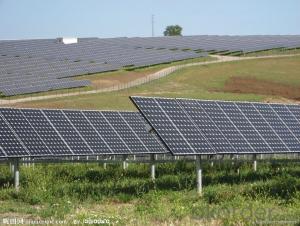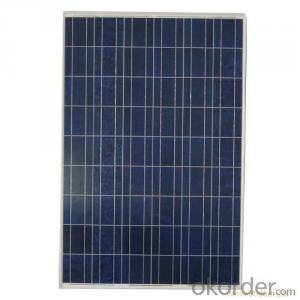Various Solar Energy Systems - 250W Poly Solar Panel 0.45/W A Grade Good Quality
- Loading Port:
- China main port
- Payment Terms:
- TT OR LC
- Min Order Qty:
- 1 watt
- Supply Capability:
- 10000000 watt/month
OKorder Service Pledge
OKorder Financial Service
You Might Also Like
Product Description:
Hot Sale !!! Quality and Safety of 245w-320w Poly Solar Panel
1. Rigorous quality control meets the highest international standards.
2. High-transmissivity low-iron tempered glass, strong aluminium frame.
3. Using UV-resistant silicon.
4. IS09001/14001/CE/TUV/UL
Warranties of 245w-320w Poly Solar Panel
1. 10 years limited product warranty
2. 15 years at 90% of the minimal rated power output
3. 25 years at 80% of the minimal rated power output
Technical date of 245w-320w Poly Solar Panel
ITEM NO.: | Mono 125*125 cell ,36pcs . Power range from 80Wp-100Wp | ||||||||
Maximum Power(W) | 80 | 85 | 90 | 95 | 100 | ||||
Optimum Power Voltage(Vmp) | 17.81 | 17.89 | 17.94 | 17.99 | 18.06 | ||||
Optimum Operatige Current(Imp) | 4.78 | 4.91 | 5.12 | 5.35 | 5.59 | ||||
Open Circuit Voltage(Voc) | 21.98 | 22.05 | 22.14 | 22.28 | 22.45 | ||||
Short Circuit Current(Isc) | 4.95 | 5.15 | 5.36 | 5.65 | 5.84 | ||||
Solar Cell: | 125*125 Mono | ||||||||
Number of Cell(pcs) | 4*9 | ||||||||
Brand Name of Solar Cells | JA Cell, Bluesun Cell | ||||||||
Size of Module(mm) | 1580*808*35 | ||||||||
Caple & Connector Type | Pass the TUV Certificate | ||||||||
Frame(Material Corners,etc.) | Aluminium-alloy | ||||||||
Backing (Brand Type) | TPT | ||||||||
Cell Efficiency for 100W(%) | 15.8% | ||||||||
Weight Per Piece(KG) | 12.0KG | ||||||||
FF (%) | 70-76% | ||||||||
Junction Box Type | Pass the TUV Certificate | ||||||||
Tolerance Wattage(e.g.+/-5%) | ±3%, or 0-3% | ||||||||
Front Glass Thikness(mm) | 3.2 | ||||||||
Temperature Coefficients of Isc(%) | +0.04 | ||||||||
Temperature Coefficients of Voc(%) | -0.38 | ||||||||
Temperature Coefficients of Pm(%) | -0.47 | ||||||||
Temperature Coefficients of Im(%) | +0.04 | ||||||||
Temperature Coefficients of Vm(%) | -0.38 | ||||||||
Temperature Range | -40°C to +85°C | ||||||||
Surface Maximum Load Capacity | 2400Pa | ||||||||
Allowable Hail Load | 23m/s ,7.53g | ||||||||
Bypass Diode Rating(A) | 12 | ||||||||
Warranty | 90% of 10 years,80% of 25 years. | ||||||||
Standard Test Conditions | AM1.5 1000W/ 25 +/-2°C | ||||||||
Packing | carton or pallet | ||||||||
1*20' | 25 Pallets / 450pcs | ||||||||
1*40'STD | 25 Pallets / 100pcs | ||||||||
Features of our products:
• High conversion efficiency mono/poly-crystalline amorphous silicon solar cells
• Modules incorporate high performance bypass diodes to minimize the power drop caused by shading
• High transmittance, low-iron tempered glass
• High performance EVA encapsulant to prevent destroying and water.
• AI frame: without screw, corner connection. 8 holes on the frame can be installed easily
• Good performance of preventing from atrocious weather such as wind and hails
• Certifications: CE IEC TUV VDE UL, Class I
• 10 years 90% power output warranty

Shipping of 245w-320w Poly Solar Panel
By Sea | Delivery from Shanghai or Ningbo seaport |
By Air | Departure from Shanghai Pudong Airport |
By Express | Post by DHL, EMS, UPS, TNT. |
- Q: Can solar energy systems be used for heating and cooling?
- Yes, solar energy systems can be used for heating and cooling. Solar thermal systems can collect and store heat from the sun to provide hot water and space heating. Additionally, solar-powered air conditioning systems are also available, using solar energy to cool buildings.
- Q: Can solar energy systems be used in areas with limited access to solar junction boxes?
- Yes, solar energy systems can be used in areas with limited access to solar junction boxes. In such cases, alternative methods like micro-inverters or power optimizers can be employed to convert the DC power generated by solar panels into AC power without the need for a central junction box. These decentralized solutions allow for greater flexibility in system design and can be particularly useful in remote or challenging locations where traditional grid-connected systems may not be feasible.
- Q: How do solar energy systems impact water consumption?
- The utilization of solar energy systems has a beneficial effect on water usage. An important advantage of solar energy is its independence from water for electricity generation, unlike traditional fossil fuel power plants which heavily rely on water for cooling. This is significant as conventional power generation processes consume enormous amounts of water, contributing to water scarcity problems in various regions. On the other hand, solar energy systems utilize photovoltaic (PV) panels or concentrated solar power (CSP) technology to convert sunlight into electricity. These systems operate without the need for water, resulting in a considerable decrease in water consumption. This is especially crucial in areas with limited water resources or regions prone to drought, as solar energy offers a more sustainable and environmentally friendly alternative. Additionally, solar energy systems can indirectly contribute to water conservation. By replacing traditional energy sources with solar power, carbon emissions are greatly reduced, thereby mitigating the effects of climate change. This, in turn, helps to preserve water resources as climate change is known to worsen droughts and alter precipitation patterns. Moreover, solar energy systems can be combined with water-efficient technologies to further enhance water conservation efforts. For instance, solar-powered water pumps can be employed for irrigation, reducing the reliance on fossil fuel-powered pumps that consume substantial amounts of water. This integration of solar energy and water-saving technologies can lead to even greater water conservation and more sustainable agricultural practices. In conclusion, solar energy systems positively impact water consumption by eliminating the need for water in electricity generation and reducing carbon emissions. By promoting the adoption of solar power, we can contribute to water conservation efforts and create a more sustainable future.
- Q: Can solar energy systems be used in powering hotels or resorts?
- Yes, solar energy systems can be used to power hotels or resorts. Solar panels can be installed on the rooftops or open spaces of these buildings to harness sunlight and convert it into electricity. This renewable source of energy can provide a significant portion or even the entire power required for the hotel or resort, reducing reliance on traditional fossil fuel-based electricity and lowering operational costs. Additionally, solar energy systems can also be integrated with other energy-efficient technologies like energy storage systems and smart grids to ensure uninterrupted power supply and optimize energy usage.
- Q: Can solar energy systems be used in powering movie theaters or entertainment venues?
- Yes, solar energy systems can definitely be used to power movie theaters or entertainment venues. Movie theaters and entertainment venues require a significant amount of electricity to operate their lighting, sound systems, projectors, and other equipment. Solar energy systems can generate clean and renewable electricity by harnessing the power of the sun. By installing solar panels on the roofs or surrounding areas of these venues, they can generate a substantial amount of electricity to meet their energy needs. Solar energy systems can be designed to provide enough power to not only run the basic infrastructure of movie theaters or entertainment venues but also to support additional energy-intensive features such as heating, ventilation, and air conditioning (HVAC) systems, concession stands, and even electric vehicle charging stations. By utilizing solar energy, these venues can significantly reduce their reliance on grid electricity, lower their operational costs, and contribute to a more sustainable and eco-friendly future. In addition to the practical benefits, installing solar energy systems in movie theaters or entertainment venues can also serve as a statement of environmental responsibility and attract environmentally conscious audiences. Many people are becoming increasingly aware of the importance of renewable energy, and by showcasing their commitment to sustainability, these venues can enhance their brand image and appeal to a broader customer base. Overall, the utilization of solar energy systems in powering movie theaters or entertainment venues is not only technically feasible but also financially and environmentally advantageous. By harnessing the power of the sun, these venues can reduce their carbon footprint, save on energy costs, and contribute to a greener future for the entertainment industry.
- Q: Can solar energy systems be used in areas with limited access to solar mounting systems?
- Yes, solar energy systems can still be used in areas with limited access to solar mounting systems. There are alternative mounting options available such as ground-mounted systems, pole-mounted systems, or even floating solar panels. These alternatives allow solar energy systems to be deployed in various locations, even in areas where traditional mounting systems may not be feasible or accessible.
- Q: How do solar energy systems impact energy consumption patterns?
- Solar energy systems have a significant impact on energy consumption patterns by reducing reliance on traditional fossil fuel sources. These systems generate clean and renewable energy, thereby reducing greenhouse gas emissions and mitigating the harmful effects of climate change. Additionally, solar energy encourages a shift towards decentralized energy production and encourages individuals and businesses to become more mindful of their energy consumption, leading to greater energy efficiency and conservation.
- Q: Can a solar energy system increase the value of my home?
- Yes, a solar energy system can increase the value of your home. Studies have shown that homes with solar panels tend to sell for a higher price and have a faster selling time compared to homes without solar. This is because solar energy systems offer long-term cost savings on electricity bills and are seen as environmentally friendly, which appeals to homebuyers who are increasingly interested in sustainable and energy-efficient features. Additionally, some states offer incentives and tax credits for homeowners with solar, further adding to the financial benefits.
- Q: Can solar energy systems be installed on camping sites?
- Yes, solar energy systems can be installed on camping sites. Portable solar panels can be used to provide power for camping activities, such as charging electronic devices, lighting, and running small appliances. These systems are lightweight, easy to set up, and offer a renewable and eco-friendly source of energy for campers.
- Q: Can solar energy systems be used for powering electric vehicle component manufacturing plants?
- Yes, solar energy systems can be used to power electric vehicle component manufacturing plants. Solar panels can generate electricity that can be used directly or stored in batteries for later use. By utilizing solar energy, these plants can reduce their reliance on fossil fuels, lower their carbon footprint, and contribute to a more sustainable manufacturing process for electric vehicles.
Send your message to us
Various Solar Energy Systems - 250W Poly Solar Panel 0.45/W A Grade Good Quality
- Loading Port:
- China main port
- Payment Terms:
- TT OR LC
- Min Order Qty:
- 1 watt
- Supply Capability:
- 10000000 watt/month
OKorder Service Pledge
OKorder Financial Service
Similar products
Hot products
Hot Searches
Related keywords

